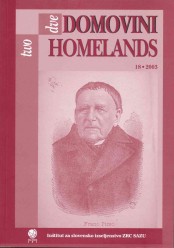“HOMELAND IS HERE AND HOMELAND IS THERE”. A RESEARCH AMONG THE PRIMORSKA EMIGRANTS ON THEIR RETURN TO SLOVENIA
Abstract
Eleven returnees from the Slovene Primorska present only a small share of people who emigrated from Slovenia after the war and later returned. Despite the fact that the presented stories differ from one another, a mutual fate of life in “two homelands” unites them.
Of the emigrated Slovenes, mainly elder people return to the homeland that wish to spend the Autumn of their lives in their native places and among local people. Reintegration into Slovene society is not easy. The people who after emigrating from their homeland did not preserve contacts with it, sense after returning home alienation, as they do not find what they have left. In such cases, the returnees must start a new life, but many are no more capable of doing so. Not so few people and even families returned to their homeland and soon went back disappointed, as they were not up to changes and new circumstances. Few persisted and re-established a new life in Slovenia.
The returnees have decided for returning to their homeland on the basis of previous information, which their relatives from the homeland or acquaintances from abroad mediated to them; the majority visited the homeland before final decision. The changes and progress in the development of Slovenia have additionally persuaded them to return. Despite the mentioned, many a surprise was waiting form them after the return; everyday life revealed the differences between the social systems they were familiar with abroad, and the one they had to confront at home.
Are Slovene emigrants returning to the homeland today? The situation has not essentially changed in comparison with the period before 1991. Life conditions in Slovenia have improved but the potential returnees need be offered more than just satisfactory living conditions, which they in the majority of cases already have in the country of their momentary residence. It is absurd to expect they would return to the homeland because of mere nostalgia. I could agree with Marina Lukšič-Hacin who claims that the fact “that in all these years no active state policy can be sensed, which would actually encourage returning home. That is valid for all varieties of emigration and returning home, including the brain drain” (2002, p. 189), contributes to such a small share of Slovene returnees.
Because of the economic crisis in Argentina, recently many descendants of Argentinean Slovenes are returning to the homeland. Yet we cannot speak of returnees in those cases of “returning” but of merely immigrating. Those people are predominantly descendants of Slovene emigrants who have preserved in the frame of the Argentinean community the perception of belonging to the Slovene nation.
For a conclusion, I would add an interesting thought by Marina Lukšič-Hacin (2002, pp. 189-190) who is asking herself whether the contemplation on encouraging returning is of any sense at all in regard of directions of global development of the present world. According to her, “the old fashion of consideration on returnees is obsolete”; thus it would be more appropriate to consider about including Slovenes abroad in important sociological, humanistic, naturalistic and economic projects with the help of modern technology.
Downloads
References
Bogovič, Alenka; Borut Cajnko, 1983, Slovenci v Franciji, Knjižica Glasnika SED, Ljubljana, Znanstveni inštitut Filozofske Fakultete Univerze Edvarda Kardelja v Ljubljani.
Čebulj - Sajko, Breda, 1992, M ed srečo in svobodo, Avstralski Slovenci o sebi, Ljubljana, samozaložba.
Čebulj - Sajko, Breda, 1999, Etnologija in izseljenstvo, Slovenci po svetu kot predmet etnoloških raziskav v letih 1926-1993, Knjižica Glasnika SED, Ljubljana, Slovensko etnološko društvo.
Drnovšek, Marjan, 1991, Pot slovenskih izseljencev na tuje, Od Ljubljane do Ellis Islanda - otoka solza v New Yorku 1880-1924, Ljubljana, Založba Mladika.
Klinar, Peter, 1976, Mednarodne migracije. Maribor, Založba Obzorja.
Lukšič - Hacin, Marina, 2002, Povratniki kot del migracijskega toka, Dve dom ovini/ Two Homelands 15, Ljubljana, Inštitut za slovensko izseljenstvo, Založba ZRC, str. 179-193.
Mislej, Irene, geslo: Izseljenci v Južni Ameriki, Enciklopedija Slovenije, 1988, 2. zvezek, Ljubljana, Mladinska knjiga, str. 224.
Prešeren, Jože, 1990, Po poteh Slovencev v svetu, Ali res živi na tujem tretjina slovenskega naroda? Slovenski izseljenski koledar 1991, Ljubljana, Slovenska izseljenska matica, str. 197-204.
Slavec, Ingrid, 1982, Slovenci v M annheimu, Knjižica Glasnika SED, Ljubljana, Znanstveni inštitut Filozofske fakultete Univerze Edvarda Kardelja v Ljubljani.
Slovar slovenskega knjižnega jezika 111, geslo: povratnik, 1979, Ljubljana, Državna založba Slovenije, str. 931.
Štefe. Tomaž, 1999, Vračanje slovenskih zdomcev in izseljencev, Slovenski izseljenski koledar 2000, Ljubljana, Slovenska izseljenska matica, str. 49-54.
Umek, Ema, 1966, Arhivi - vir proučevanja slovenskega izseljenstva, Slovenski izseljenski koledar 1967, Ljubljana, Slovenska izseljenska matica, str. 195-198.
Downloads
Published
How to Cite
Issue
Section
License

This work is licensed under a Creative Commons Attribution-NonCommercial-NoDerivatives 4.0 International License.
Authors guarantee that the work is their own original creation and does not infringe any statutory or common-law copyright or any proprietary right of any third party. In case of claims by third parties, authors commit their self to defend the interests of the publisher, and shall cover any potential costs.
More in: Submission chapter





